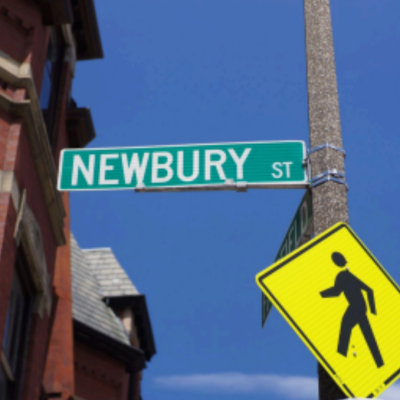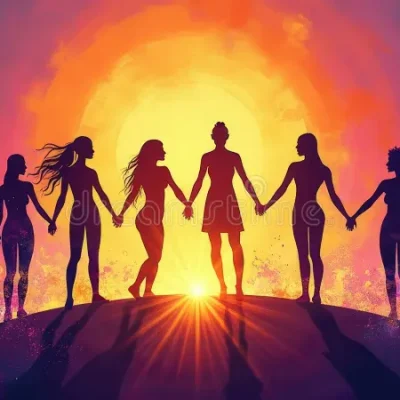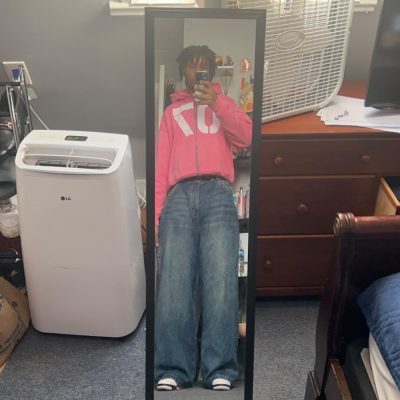Diversity Consignment – A Fashionable Space for Queer Bostonians
Among a row of townhouse style buildings that line Jamaica Plain’s Centre Street, one stands out: Diversity Consignment. With surrealist pop art featured in the windows, a chalkboard out front advertising exciting events in pastel block letters, and a rack of out of season shorts and tank tops on clearance lining the sidewalk, Diversity is eye-catching to anyone who walks past. Of course, this colorful exterior is only the beginning. The inside of the store greets its guests with an even more impressive rainbow of clothing carousels and cute, ’90s inspired handmade jewelry. The basement, though taking on a more laid-back vibe, is just as aesthetic: purple LED lights and an assortment of vintage records creating a more grunge and (literally) underground space.
The environment that Diversity provides is truly refreshing. As someone who loves second hand shopping, I’ve found that a lot of stores in Boston lack an identity. While the unorganized and mix-and-match system is part of the second hand experience, Diversity has managed to maintain this while keeping a cohesive theme of nostalgic and slightly alternative campiness present. I always assumed that this ambiance was the result of careful curation in the clothes they consign, but general manager Maddy Dunn says that the store doesn’t try to serve one particular fashion sense.
“We try to keep it mellow,” she said when describing the store’s style. Instead of marketing to one particular style, she said they wanted what they sell to appeal to whatever the community may want. “It’s like a very DIY space,” she said. “It’s really just everybody coming together in our neighborhood and community.”

Instead of relying on their clothes to create a certain atmosphere, Diversity’s unique aesthetic is largely thanks to the work of local artists, whom Dunn highlighted various times throughout our talk. “[Working with local artists] was one of the first key points that the store wanted to do,” she explained. Four years later, this trend has not died down. Dunn said they’ve now seen a cycle of artists coming into the store, seeing the work of other artists, and then wanting to use the store as a platform for their work. This has not only created a fun and inviting ambiance for Diversity, but also highlights their greater goal of working to serve the community.
“What we do every single day in here … is work to help our community,” Dunn said. Showcasing local artwork has been a great way for them to do so, but Diversity also has a lot of subtle ways that it provides communal support. As their name suggests, the store is incredibly committed to diversity and inclusion, with a mission statement that describes challenging social norms and “creating a safe space for all.” This goal is especially evident in their continual support of the queer community. While many stores (at least in Boston) have no problem dawning the banner of pride flags that lines Diversity’s doorway – though a few take them down after June – Diversity is special in its commitment to a truly safe and accepting shopping experience. Their basement has been the site of various pride celebrations and staff in the store proudly exist under a variety of identities.
What’s most notable is Diversity’s nonbinary system of clothing organization: items are separated by what they are and not what gender they’ve been assigned, giving all customers a safe and affirming shopping experience. The safety that this shopping experience provides is evident in customer interactions with the apparel. Unlike many second hand stores, Diversity is incredibly organized and customers operate with care, examining their items before committing to purchases and making sure they know where everything is meant to go. Everyone in the store feels free to take their time and experiment, respecting the space because the space respects them.

Of course, Diversity is not the first second hand clothing store to provide support for LGBTQ+ people. In the 1950s and ’60s, at the height of the Lavender Scare, thrift stores were relatively safe places for queer people to shop — adopting a “don’t ask, don’t tell” type policy that was progressive and accepting for the time. Later in the 1990s, stores like Out of the Closet and (the tragically closed) Boomerangs took a more direct approach by giving money and resources to support those suffering through the AIDS crisis. Even the gender fluidity that Diversity highlights has been celebrated before in the second hand world. Beet, a medium contributor, describes how shopping in thrift and consignment stores allowed them to experiment with gender and expression in a way that other stores couldn’t: “[In second hand stores,] you can pass from men’s pants to women’s pants and back into men’s jackets without being aware where one ended and the other began.”
What makes Diversity special, then, is not just its support for the community but the way it’s so inviting in its support. Nowhere is this more clear than in their basement where a couch, gaming system, and pool table invite customers to hang out with or without purchase. Such an environment shows the true care of Diversity. They are motivated not just by profit but by providing a safe space for the community. As a queer teen, I’ve always felt free to be myself playing Mario Party in Diversity’s basement and that’s not a feeling I can get anywhere. That’s a feeling that comes from a space dedicated to helping the community.
As Dunn pointed out, Diversity Consignment is a consignment store first and foremost; its primary goal is to make people feel comfortable in their clothes by selling them said clothes. But she also said that aspects like local art and having a couch to play video games on are crucial to protecting the community they claim to serve and that other businesses, especially local ones, should invest in the same communal practices. Until they do, I’d encourage you all to check out Diversity and see all they have to offer Boston’s community.










